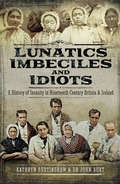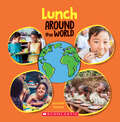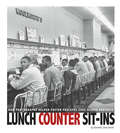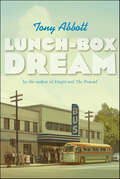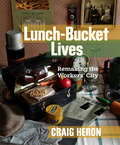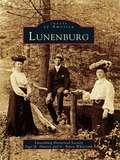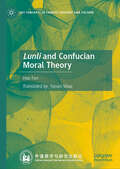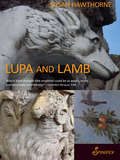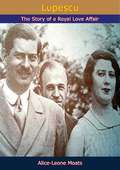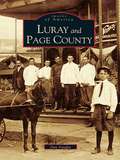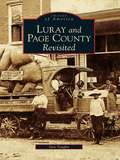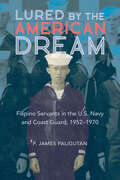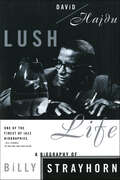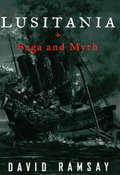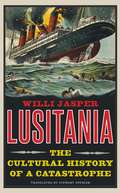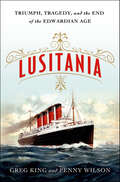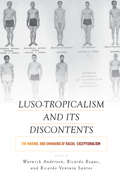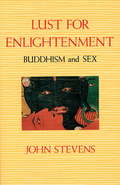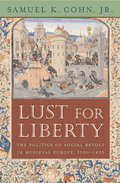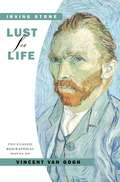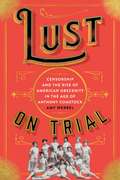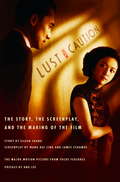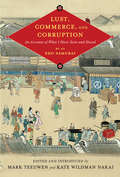- Table View
- List View
Lunatics, Imbeciles and Idiots: A History of Insanity in Nineteenth-Century Britain and Ireland
by Kathryn Burtinshaw Dr. John Burt&“Reveals the grisly conditions in which the mentally ill were kept . . . [and] harrowing details of the inhumane and gruesome treatment of these patients.&”—Daily Mail In the first half of the nineteenth century, treatment of the mentally ill in Britain and Ireland underwent radical change. No longer manacled, chained and treated like wild animals, patient care was defined in law and medical understanding, and treatment of insanity developed. Focusing on selected cases, this new study enables the reader to understand how progressively advancing attitudes and expectations affected decisions, leading to better legislation and medical practice throughout the century. Specific mental health conditions are discussed in detail and the treatments patients received are analyzed in an expert way. A clear view of why institutional asylums were established, their ethos for the treatment of patients, and how they were run as palaces rather than prisons giving moral therapy to those affected becomes apparent. The changing ways in which patients were treated, and altered societal views to the incarceration of the mentally ill, are explored. The book is thoroughly illustrated and contains images of patients and asylum staff never previously published, as well as first-hand accounts of life in a nineteenth-century asylum from a patient&’s perspective. Written for genealogists as well as historians, this book contains clear information concerning access to asylum records and other relevant primary sources and how to interpret their contents in a meaningful way. &“Through the use of case studies, this book adds a personal note to the historiography in a way that is often missing from scholarly works.&”—Federation of Family History Societies
Lunch Around the World: Around The World (Around The World Ser.)
by Jeanette FerraraDiscover countries, cultures, and traditions in this new series!Every day, all around the world, kids go to school, eat lunch and play games... And yet, these universal experiences, can look very different between different countries. These books will take our readers on a trip around the globe to celebrate diverse cultures and traditions, and will show us how different (and how similar) we all are!
Lunch Counter Sit-Ins: How Photographs Helped Foster Peaceful Civil Rights Protests (Captured History)
by Danielle Smith-LleraOn point historical photographs combined with strong narration bring the saga of the Woolworth lunch counter sit-ins in the early 1960s to life. Readers will learn about the four brave college students who started it all, as well as the many who came after. These events changed the world. The photographer who took the photographs shown in this book is now in his 90s, but he agreed to an exclusive interview for this book.
Lunch-Box Dream
by Tony AbbottBobby and his family are visiting Civil War battlefields on the eve of the war's centenary, while inside their car, quiet battles rage. When an accident cuts their trip short, they return home on a bus and witness an incident that threatens to deny a black family seats. What they don't know is the reason for the family's desperation to be on that bus: a few towns away, their child is missing.Lunch-Box Dream presents Jim Crow, racism, and segregation from multiple perspectives. In this story of witnessing without understanding, a naïvely prejudiced boy, in brief flashes of insight, starts to identify and question his assumptions about race.
Lunch-Bucket Lives: Remaking the Workers’ City
by Craig HeronLunch-Bucket Lives takes the reader on a bumpy ride through the history of Hamilton’s working people from the 1890s to the 1930s. It ambles along city streets, peers through kitchen doors and factory windows, marches up the steps of churches and fraternal halls, slips into saloons and dance halls, pauses to hear political speeches, and, above all, listens for the stories of men, women, youths, and children from families where people relied mainly on wages to survive. Heron takes wage-earning as a central element in working-class life, but also looks beyond the workplace into the households and neighbourhoods—settlement patterns and housing, marriage, child care, domestic labour, public health, schooling, charity and social work, popular culture, gender identities, ethnicity and ethnic conflict, and politics in various forms—presenting a comprehensive view of working-class life in the first half of the twentieth century. This book has been published with the help of a grant from the Federation for the Humanities and Social Sciences, through the Awards to Scholarly Publications Program, using funds provided by the Social Sciences and Humanities Research Council of Canada.
Luncheon of the Boating Party
by Susan VreelandBestselling author Susan Vreeland returns with a vivid exploration of one of the most beloved Renoir paintings in the worldInstantly recognizable, Auguste Renoir's masterpiece depicts a gathering of his real friends enjoying a summer Sunday on a café terrace along the Seine near Paris. A wealthy painter, an art collector, an Italian journalist, a war hero, a celebrated actress, and Renoir's future wife, among others, share this moment of la vie moderne, a time when social constraints were loosening and Paris was healing after the Franco-Prussian War. Parisians were bursting with a desire for pleasure and a yearning to create something extraordinary out of life. Renoir shared these urges and took on this most challenging project at a time of personal crises in art and love, all the while facing issues of loyalty and the diverging styles that were tearing apart the Impressionist group. Narrated by Renoir and seven of the models and using settings in Paris and on the Seine, Vreeland illuminates the gusto, hedonism, and art of the era. With a gorgeous palette of vibrant, captivating characters, she paints their lives, loves, losses, and triumphs in a brilliant portrait of her own.
Lunenburg
by Inge H. Hunter Lunenburg Historical Society G. Barry WhitcombThe name "Luneburg" was coined for King George II of England, who was also the duke of Luneburg, Germany, in 1727. The final name, Lunenburg, was probably a result of misspelling in the early records of the town. On August 1, 1728, Lunenburg was officially granted township but, as early as 1726, a variety of industries had been started and twenty-six houses had been built. In the late nineteenth century, the town returned to predominately agriculture and, today, is a rural residential community for industries in neighboring cities. Through a diverse collection of vintage images, Lunenburg will take you on a historical journey through the town's engaging past. Within these pages, you will see photographs of the early businesses that were established, such as bookbinders, blacksmiths, furniture makers, and shoe manufacturers; you will visit many homes, churches, schools and government buildings; and you will experience the daily lives of residents during this exciting time in history.
Lunli and Confucian Moral Theory (Key Concepts in Chinese Thought and Culture)
by Hao FanThis book interprets the concepts, philosophies and cultural traditions of lunli (roughly construed as “relationships and rationality”) from the perspective and domain of ‘dialogue civilization.’ On the conceptual level, it expounds the common reference and different tenets of the Chinese lunli and the Western “ethic”, exploring the characteristics of lunli and "ethic" in civilization history, considering notably the difference between unification of family and state and division of the two at the embryonic stage of civilization. The book draws on the lunli-oriented culture and religion-based culture to demonstrate the difference between Chinese lunli and Western “ethic” in their respective top design and ultimate care, by exploring the issue “What the world would be like, if there were no lunli” for the Chinese and “What the world would be like, if there were no God” for westerners. Since lunli is the most prominent feature of “being Chinese”, or the most symbolic and interpretative Chinese cultural concept, this pivot provides a key introduction for Western readers not only to the concept itself, but also to modern day Chinese culture.
Lupa and Lamb
by Susan HawthorneThis collection of imagist poems combines mythology, archaeology, and translation. Susan Hawthorne draws on the history and prehistory of Rome and its neighbors to explore how the past is remembered. Under the guidance of Curatrix, Director of the Musæum Matricum, and Latin poet, Sulpicia, travelers Diana and Agnese are led through the mythic archives about wolves and sheep before attending an epoch-breaking party to which they are invited by Empress Livia. An enticing tapestry of real and imaginary texts that gladden the readers' hearts, Lupa and Lamb is poet Susan Hawthorne at her best.
Lupescu: The Story of a Royal Love Affair
by Alice-Leone MoatsIn 2003, the coffins of King Carol II and Princess Elena of Romania were repatriated to their native Romania from the resting place in exile in Portugal. This book recounts the story of Magda Lupescu, the red haired courtesan, who would become the wife of King Carol and future princess of Romania. Their affair had rocked the monarchy and all of Europe after the tumult of the First World War. The reign of King Carol was mired in intrigue and subterfuge amid the right wing surge in Germany and Central Europe, he was forced to abdicate and flee as the Second World War began. Elena and Carol travelled to South America in exile, before returning to Europe and settling in Portugal after World War Two ended.
Luray and Page County (Images of America)
by Dan VaughnFormed out of necessity in 1831, Page County had a great need to operate within its own boundaries of the Massanutten and Blue Ridge Mountains. A very unique situation arose when this rural area was coupled with the discovery in 1878 of something as spectacular as the Luray Caverns. Along with this new fame followed a large influx of tourists, industry, and varied commerce into the entire county from the lifeline created by the formation of the Shenandoah Valley Railroad in 1881. During the reconstruction years after the Civil War, and with the formation of "land and improvement" companies throughout the United States, Page County, along with the rest of the country, was booming. In fact, this unbridled growth was happening much too fast for this newly reformed country. This in turn brought about a severe recession in the 1890s that affected everyone, including the people of Page, no matter how secure they may have seemed with their new attraction. The culmination of these events initiated a quaint photographic history that is contained within the pages of Images of America: Luray and Page County.
Luray and Page County Revisited
by Dan VaughnLuray Caverns, discovered in the quiet valley community of Luray in 1878, became the main attraction in Page County. In hopes of capitalizing on this new found "Wonder of the World," executives of the Shenandoah Valley Railroad completed the rail from Hagerstown and Basic City to Luray by 1881. Mann Almond drove the final ceremonial spike just north of Deford's Tannery in Luray. With the arrival of the railroad came a new economy supported by passengers, excursionists, lodging, and freight transport. The bulk of these transports were Eureka Mining Company's mineral extractions and Shenandoah's "BigGem" iron bloom shipments. Luray's own "Mercantile Mile" leading to the caverns was laden with storehouses, offering goods found in larger cities, and the rail brought visitors in droves. The photographers who produced the images contained here did so only as a means of income, but today their work is our visual link to the past.
Lured by the American Dream: Filipino Servants in the U.S. Navy and Coast Guard, 1952-1970 (Asian American Experience)
by P. James PaligutanStarting in 1952, the United States Navy and Coast Guard actively recruited Filipino men to serve as stewards--domestic servants for officers. Oral histories and detailed archival research inform P. James Paligutan's story of the critical role played by Filipino sailors in putting an end to race-based military policies. Constrained by systemic exploitation, Filipino stewards responded with direct complaints to flag officers and chaplains, rating transfer requests that flooded the bureaucracy, and refusals to work. Their actions had a decisive impact on seagoing military’s elimination of the antiquated steward position. Paligutan looks at these Filipino sailors as agents of change while examining the military system through the lens of white supremacy, racist perceptions of Asian males, and the motives of Filipinos who joined the armed forces of the power that had colonized their nation. Insightful and dramatic, Lured by the American Dream is the untold story of how Filipino servicepersons overcame tradition and hierarchy in their quest for dignity.
Lush Life: A Biography of Billy Strayhorn
by David Hajdu&“Arguably the finest biography yet written about a jazz musician . . . [It] will fascinate readers who have never heard a note of Strayhorn&’s music.&” —Joel E. Seigel, Washington City Paper A finalist for the National Book Critics Circle Award Billy Strayhorn (1915–67) was one of the greatest composers in the history of American music, the creator of a body of work that includes such standards as &“Take the &‘A&’ Train.&” Yet all his life Strayhorn was overshadowed by his friend and collaborator Duke Ellington, with whom he worked for three decades as the Ellington Orchestra&’s ace songwriter and arranger. A &“definitive&” corrective (USA Today) to decades of patchwork scholarship and journalism about this giant of jazz, David Hajdu&’s Lush Life is a vibrant and absorbing account of the &“lush life&” that Strayhorn and other jazz musicians led in Harlem and Paris. While composing some of the most gorgeous American music of the twentieth century, Strayhorn labored under a complex agreement whereby Ellington took the bows for his work. Until his life was tragically cut short by cancer and alcohol abuse, the small, shy composer carried himself with singular style and grace as one of the few jazzmen to be openly homosexual. Lush Life has sparked an enthusiastic revival of interest in Strayhorn&’s work and is already acknowledged as a jazz classic. &“A book as beautiful and intelligent as its subject. David Hajdu has brought all my dear memories of Billy Strayhorn to life.&” —Lena Horne &“It is a mark of excellence of this biography that it leaves one wanting nothing so much as to listen to the music.&” —Jonathan Yardley, The Washington Post Book World
Lusitania: Saga and Myth
by David RamsayAn objective and enthralling account of the sinking of the Lusitania, which unravels many of the myths and, for the first time, explains the true significance of that terrible disaster. The saga of the Lusitania is one of the most remarkable in the annals of maritime history. State-of-the-art when she went into service and the first express liner to be equipped with steam turbines, she outclassed all her rivals. She triumphantly restored British supremacy on the North Atlantic passenger routes and became an acknowledged commercial success; she was highly popular with her regular passengers. Her sinking in May 1915 by a German U-boat, with heavy loss of life, was at that time the most savage attack on civilians in the course of war, and was widely denounced in allied and neutral countries. From that day her loss has become encrusted with legends (including conspiracy theories), many of them created by German propaganda. In this new book David Ramsay has unraveled those myths and legends and tells a clear and compelling saga of terrible maritime disaster and clashes among three powerful nations. It is a story of potentates and presidents, ambassadors and ministers of state, bankers, shipping magnates, spies, and, not least, Captain William Turner, who had to defend himself against charges of incompetence and fight for his reputation. Based on detailed research, this new book almost certainly contains the most objective account of the history of the liner and the circumstances surrounding her sinking. The sinking of Lusitania, which took a mere eighteen minutes, led to a loss of life comparable with the Titanic disaster, and the ramifications were felt across Europe and America; this masterly telling of the story will intrigue the general reader as much as it does the historian and enthusiast.
Lusitania: The Cultural History of a Catastrophe
by Willi Jasper Mr Stewart SpencerA fascinating reassessment of a turning point in the First World War, revealing its role in shaping the German psyche On May 7, 1915, the Lusitania, a large British luxury liner, was sunk by a German submarine off the Irish coast. Nearly 1,200 people, including 128 American citizens, lost their lives. The sinking of a civilian passenger vessel without warning was a scandal of international scale and helped precipitate the United States' decision to enter the conflict. It also led to the immediate vilification of Germany. Though the ship's sinking has preoccupied historians and the general public for over a century, until now the German side of the story has been largely untold. Drawing on varied German sources, historian Willi Jasper provides a comprehensive reappraisal of the sinking and its aftermath that focuses on the German reaction and psyche. The attack on the Lusitania, he argues, was not simply an escalation of violence but signaled a new ideological, moral, and religious dimension in the struggle between German Kultur and Western civilization.
Lusitania: Triumph, Tragedy, and the End of the Edwardian Age
by Greg King Penny WilsonOn the 100th Anniversary of its sinking, King and Wilson tell the story of the Lusitania's glamorous passengers and the torpedo that ended an era and prompted the US entry into World War I.Lusitania: She was a ship of dreams, carrying millionaires and aristocrats, actresses and impresarios, writers and suffragettes – a microcosm of the last years of the waning Edwardian Era and the coming influences of the Twentieth Century. When she left New York on her final voyage, she sailed from the New World to the Old; yet an encounter with the machinery of the New World, in the form of a primitive German U-Boat, sent her – and her gilded passengers – to their tragic deaths and opened up a new era of indiscriminate warfare.A hundred years after her sinking, Lusitania remains an evocative ship of mystery. Was she carrying munitions that exploded? Did Winston Churchill engineer a conspiracy that doomed the liner? Lost amid these tangled skeins is the romantic, vibrant, and finally heartrending tale of the passengers who sailed aboard her. Lives, relationships, and marriages ended in the icy waters off the Irish Sea; those who survived were left haunted and plagued with guilt.Authors Greg King and Penny Wilson resurrect this lost, glittering world to show the golden age of travel and illuminate the most prominent of Lusitania's passengers. Rarely was an era so glamorous; rarely was a ship so magnificent; and rarely was the human element of tragedy so quickly lost to diplomatic maneuvers and militaristic threats.
Luso-Tropicalism and Its Discontents: The Making and Unmaking of Racial Exceptionalism
by Warwick Anderson Ricardo Ventura Santos Ricardo RoqueModern perceptions of race across much of the Global South are indebted to the Brazilian social scientist Gilberto Freyre, who in works such as The Masters and the Slaves claimed that Portuguese colonialism produced exceptionally benign and tolerant race relations. This volume radically reinterprets Freyre’s Luso-tropicalist arguments and critically engages with the historical complexity of racial concepts and practices in the Portuguese-speaking world. Encompassing Brazil as well as Portuguese-speaking societies in Africa, Asia, and even Portugal itself, it places an interdisciplinary group of scholars in conversation to challenge the conventional understanding of twentieth-century racialization, proffering new insights into such controversial topics as human plasticity, racial amalgamation, and the tropes and proxies of whiteness.
Lust for Enlightenment: Buddhism and Sex
by John StevensOver the centuries, Buddhism has responded to sexuality in a variety of fascinating ways, sometimes suppressing the sexual urge, sometimes sublimating it, sometimes cultivating it, and, on the highest levels, transforming it. This book reveals how Buddhists, beginning with Shakyamuni Buddha himself, relate to the "inner fire" that drives humankind. Included are chapters on the Buddha's love life before his enlightenment and his later relationships with women; the tantric approach to sex among Buddhists of ancient India, Tibet, China, and Japan; Zen in the art of love; and a positive discussion of women and Buddhism.
Lust for Gold
by Dale ChaseIn 1849 the promise of gold brings many a man to California, but most find more hardship than riches.Jesse Quinn, a golden-haired twenty-year-old is among them. He settles into the gold camp of Whiskey Slide to work with two other men in an effort that barely yields enough to keep them alive. With merchants charging exorbitant prices for provisions, it’s said men dig for food, not gold.After hardship and disappointment, Jesse moves to another camp, Dutch Flat, where he takes up with the stern and silent Abel Munday. As the two work Abel’s claim with success, things take a positive turn for Jesse. Can Jesse bring some light into the darkness that’s plagued Abel much of his life? Together, they just might be able to fine something richer than gold.
Lust for Liberty: The Politics of Social Revolt in Medieval Europe, 1200-1425
by Samuel K. Cohn Jr.Lust for Liberty challenges long-standing views of popular medieval revolts. Comparing rebellions in northern and southern Europe over two centuries, Samuel Cohn analyzes their causes and forms, their leadership, the role of women, and the suppression or success of these revolts. Popular revolts were remarkably common--not the last resort of desperate people. Leaders were largely workers, artisans, and peasants. Over 90 percent of the uprisings pitted ordinary people against the state and were fought over political rights--regarding citizenship, governmental offices, the barriers of ancient hierarchies--rather than rents, food prices, or working conditions. After the Black Death, the connection of the word "liberty" with revolts increased fivefold, and its meaning became more closely tied with notions of equality instead of privilege. The book offers a new interpretation of the Black Death and the increase of and change in popular revolt from the mid-1350s to the early fifteenth century. Instead of structural explanations based on economic, demographic, and political models, this book turns to the actors themselves--peasants, artisans, and bourgeois--finding that the plagues wrought a new urgency for social and political change and a new self- and class-confidence in the efficacy of collective action.
Lust for Life: The Story of Vincent Van Gogh
by Irving StoneThe Classic Biographical Novel of Vincent Van Gogh by the Master Storyteller of Our Times Since its initial publication in 1934, Irving Stone's Lust for Life has been a critical success, a multimillion-copy bestseller, and the basis for an Academy Award-winning movie. The most famous of all of Stone's novels, it is the story of Vincent Van Gogh-brilliant painter, passionate lover, and alleged madman. Here is his tempestuous story: his dramatic life, his fevered loves for both the highest-born women and the lowest of prostitutes, and his paintings-for which he was damned before being proclaimed a genius. The novel takes us from his desperate days in a northern coal mine to his dazzling years in the south of France, where he knew the most brilliant artists (and the most depraved whores). Finally, it shows us Van Gogh driven mad, tragic and triumphant at once. No other novel of a great man's life has so fascinated the American public for generations.
Lust on Trial: Censorship and the Rise of American Obscenity in the Age of Anthony Comstock
by Amy WerbelAnthony Comstock was America’s first professional censor. From 1873 to 1915, as Secretary of the New York Society for the Suppression of Vice, Comstock led a crusade against lasciviousness, salaciousness, and obscenity that resulted in the confiscation and incineration of more than three million pictures, postcards, and books he judged to be obscene. But as Amy Werbel shows in this rich cultural and social history, Comstock’s campaign to rid America of vice in fact led to greater acceptance of the materials he deemed objectionable, offering a revealing tale about the unintended consequences of censorship.In Lust on Trial, Werbel presents a colorful journey through Comstock’s career that doubles as a new history of post–Civil War America’s risqué visual and sexual culture. Born into a puritanical New England community, Anthony Comstock moved to New York in 1868 armed with his Christian faith and a burning desire to rid the city of vice. Werbel describes how Comstock’s raids shaped New York City and American culture through his obsession with the prevention of lust by means of censorship, and how his restrictions provided an impetus for the increased circulation and explicitness of “obscene” materials. By opposing women who preached sexual liberation and empowerment, suppressing contraceptives, and restricting artistic expression, Comstock drew the ire of civil liberties advocates, inspiring more open attitudes toward sexual and creative freedom and more sophisticated legal defenses. Drawing on material culture high and low, including numerous examples of the “obscenities” Comstock seized, Lust on Trial provides fresh insights into Comstock’s actions and motivations, the sexual habits of Americans during his era, and the complicated relationship between law and cultural change.
Lust, Caution: The Story, the Screenplay, and the Making of the Film
by Eileen Chang Wang Hui LingA major motion picture (2007) from Oscar-winning director Ang Lee (Crouching Tiger, Hidden Dragon; Brokeback Mountain): an intensely passionate story of love and espionage, set in Shanghai during World War II.In the midst of the Japanese occupation of China and Hong Kong, two lives become intertwined: Wong Chia Chi, a young student active in the resistance, and Mr. Yee, a powerful political figure who works for the Japanese occupational government. As these two move deftly between Shanghai’s tea parties and secret interrogations, they become embroiled in the complicated politics of wartime—and in a mutual attraction that may be more than what they expected. Written in lush, lavish prose, and with the tension of a political thriller, Lust, Caution brings 1940s Shanghai artfully to life even as it limns the erotic pulse of a doomed love affair.
Lust, Commerce, and Corruption: An Account of What I Have Seen and Heard, by an Edo Samurai (Translations from the Asian Classics)
by Anne Walthall Kate Wildman Nakai John Breen Trans. Eds. Teeuwen Mark Fumiko UmezawaBy 1816, Japan had recovered from the famines of the 1780s and moved beyond the political reforms of the 1790s. Despite persistent economic and social stresses, the country seemed to be approaching a new period of growth. The idea that the shogunate would not last forever was far from anyone's mind.Yet, in that year, an anonymous samurai author completed one of the most detailed critiques of Edo society known today. Writing as Buyo Inshi, "a retired gentleman of Edo," he expresses a profound despair with the state of the realm and with people's behavior and attitudes. He sees decay wherever he turns and believes the world will soon descend into war.Buyo shows a familiarity with many corners of Edo life that one might not expect in a samurai. He describes the corruption of samurai officials; the suffering of the poor in villages and cities; the operation of brothels; the dealings of blind moneylenders; the selling and buying of temple abbotships; and the dubious strategies townspeople use in the law courts. Perhaps the frankness of his account, which contains a wealth of concrete information about Edo society, made him prefer to remain anonymous.This volume contains a full translation of Buyo's often-quoted but rarely studied work by a team of specialists on Edo society. Together with extensive annotation of the translation, the volume includes an introduction that situates the text culturally and historically.
